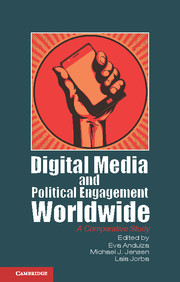Book contents
- Frontmatter
- Contents
- List of Tables and Figures
- Contributors
- Acknowledgments
- Introduction
- 1 The Impact of Digital Media on Citizenship from a Global Perspective
- 2 Recent Shifts in the Relationship between the Internet and Democratic Engagement in Britain and the United States
- 3 Political Engagement and the Internet in the 2008 U.S. Presidential Elections
- 4 Online Political Participation in the United States and Spain
- 5 Internet Use and Political Attitudes in Europe
- 6 Digital Media and Offline Political Participation in Spain
- 7 Online Participation in Italy
- 8 On the Causal Nature of the Relationship between Internet Access and Political Engagement
- 9 The Uses of Digital Media for Contentious Politics in Latin America
- 10 Opening Closed Regimes
- 11 Digital Media and Political Attitudes in China
- Conclusion
- References
- Index
11 - Digital Media and Political Attitudes in China
Published online by Cambridge University Press: 05 July 2012
- Frontmatter
- Contents
- List of Tables and Figures
- Contributors
- Acknowledgments
- Introduction
- 1 The Impact of Digital Media on Citizenship from a Global Perspective
- 2 Recent Shifts in the Relationship between the Internet and Democratic Engagement in Britain and the United States
- 3 Political Engagement and the Internet in the 2008 U.S. Presidential Elections
- 4 Online Political Participation in the United States and Spain
- 5 Internet Use and Political Attitudes in Europe
- 6 Digital Media and Offline Political Participation in Spain
- 7 Online Participation in Italy
- 8 On the Causal Nature of the Relationship between Internet Access and Political Engagement
- 9 The Uses of Digital Media for Contentious Politics in Latin America
- 10 Opening Closed Regimes
- 11 Digital Media and Political Attitudes in China
- Conclusion
- References
- Index
Summary
Introduction
In the summer of 2009, a judicial case related to the death of a government official in Hubei Province came to national prominence through internet forums. A female pedicure worker, Deng Yujiao, refused the request for sexual service from Deng Guida, the director of a local township office. She stabbed him several times while trying to fend him off, which resulted in his death. Deng turned herself in to the police and was initially charged with murder. This case was quickly picked up on the internet and accumulated more than 4 million posts across different websites (Wines 2009). Internet users were angered by her treatment in this case. For Chinese netizens, this case exemplifies their impotence in the face of corrupt and immoral officials, social injustice, and the lack of respect in the society. Deng Yujiaowas hailed as a national hero who resisted the abuse of power that is widely perceived in China. National outcry on the internet even caused several street demonstrations. After a failed attempt to play down the incident online, Chinese authorities were pressured to drop the murder charges, grant her bail, and charge her with intentional assault. She was found guilty but was eventually released without sentencing as a result of her “mental state.”
The Deng Yujiao incident is one of many examples in which internet news and online discussions influence government policies and decisions and politicians’ behavior in China (see Chase and Mulvenon 2002; Yang 2003; Zheng and Wu 2005; Tai 2006). These kinds of cases are becoming more and more frequent, and they point to two related trends: attention to the increasing dynamism in Chinese civil society and increasing demands for individual and collective rights. In fact, demands that have received positive responses from the Chinese government span corruption cases, disputes regarding class stratification, and some moral issues and concerns related to abuses of power. As those critiques are not a direct threat to the regime itself, they can often produce a favorable response. Yang (2003) notes that the emerging rights consciousness is accompanied by a tendency toward the loosening of political control in certain areas, which leaves more room for political activity among individuals and organizations. Some members of the current regime have challenged the government's censorship powers on the basis of a reading of the constitution that regards its speech protections as an individual right.
- Type
- Chapter
- Information
- Digital Media and Political Engagement WorldwideA Comparative Study, pp. 221 - 239Publisher: Cambridge University PressPrint publication year: 2012
- 5
- Cited by

